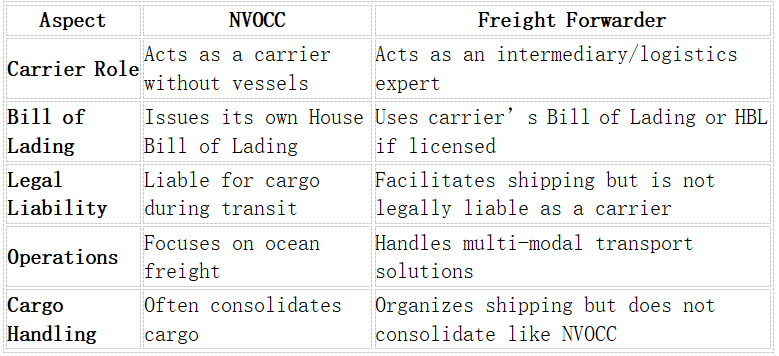When dealing with international shipping and logistics, two common terms often arise: NVOCC (Non-Vessel Operating Common Carrier) and freight forwarder. While they share similarities in managing cargo transportation, their roles, responsibilities, and legal standings differ significantly. Understanding these differences can help businesses choose the right partner for their shipping needs.
1. What is an NVOCC?
An NVOCC (Non-Vessel Operating Common Carrier) is a company that provides ocean freight services without operating its own vessels. Instead, it leases space from actual shipping lines and sells that space to customers. In many cases, an NVOCC acts as a carrier to shippers and a shipper to carriers, serving as a middleman between cargo owners and vessel operators.
Key Responsibilities of an NVOCC:
· Issuing its own House Bill of Lading (HBL) to shippers.
· Leasing and consolidating container space from ocean carriers.
· Handling cargo bookings, documentation, and customs clearance.
· Managing container stuffing and de-stuffing for consolidated shipments.
Since NVOCCs take on certain carrier responsibilities, they are often legally liable for cargo during transit, which distinguishes them from traditional freight forwarders.
2. What is a Freight Forwarder?
A freight forwarder is a logistics service provider that arranges the transportation of goods on behalf of shippers. Unlike an NVOCC, a freight forwarder does not assume the role of a carrier. Instead, it acts as a coordinator, managing various aspects of the shipping process, including documentation, customs clearance, warehousing, and multi-modal transport solutions.
Key Responsibilities of a Freight Forwarder:
· Booking cargo with ocean, air, rail, or trucking carriers.
· Preparing shipping and customs documents.
· Offering warehousing, packaging, and cargo insurance services.
· Providing logistics solutions, including route optimization and cost-effective transport.
Freight forwarders work closely with multiple carriers to offer flexible transport options, but they do not issue their own House Bill of Lading unless they are also licensed as an NVOCC.
3. Key Differences Between NVOCC and Freight Forwarder

While some companies operate as both NVOCCs and freight forwarders, these roles remain distinct in the shipping industry.
4. Which One Should You Choose?
The choice between an NVOCC and a freight forwarder depends on your business needs:
· If you require direct shipping contracts with carriers and prefer a carrier-like service, an NVOCC might be a better fit.
· If you need end-to-end logistics management, including customs clearance, warehousing, and multimodal transport, a freight forwarder is likely the right choice.
For many businesses, working with both can provide the best of both worlds—an NVOCC for ocean freight management and a freight forwarder for comprehensive supply chain solutions.
Both NVOCCs and freight forwarders play essential roles in international trade, but their functions differ significantly. Understanding these differences can help businesses make informed shipping decisions. Whether choosing an NVOCC for direct ocean freight management or a freight forwarder for full logistics coordination, selecting the right partner can optimize costs, improve efficiency, and ensure a smooth shipping process.






